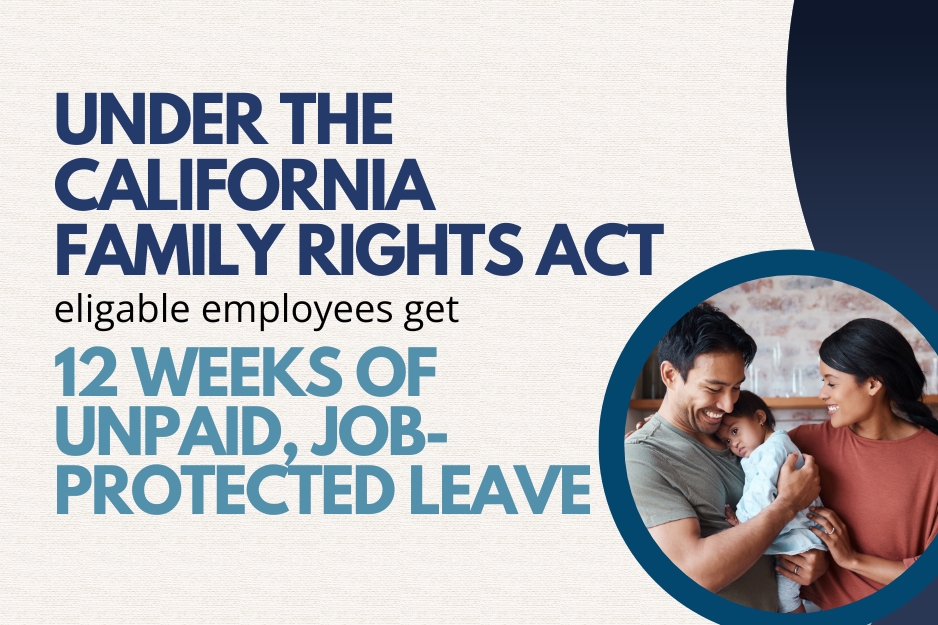
As a California employee, it is essential to be aware of your rights under the California Family Rights Act (CFRA). This state law provides eligible employees up to 12 weeks of unpaid, job-protected leave per calendar year for specific family and medical reasons.
Understanding CFRA leave can help you navigate challenging situations and ensure that you can take advantage of this important benefit when needed.

Family Medical Leave Act Eligibility
To be eligible for CFRA in California, you must work for a covered employer with at least 50 employees within a 75-mile radius. If you work for a smaller employer or one located outside of this radius, you may not be covered under CFRA.
Additionally, you must have worked for your employer for at least 12 months and have clocked in at least 1,250 hours during the previous year. Employers are also required to maintain group health insurance coverage during CFRA leave.
Congratulations if you meet these criteria – you are likely eligible for CFRA!
What are Qualifying Reasons to Take Family Leave?
CFRA leave can be taken for a variety of family and medical reasons, including the birth or adoption of a child, caring for a seriously ill family member, or your own serious health condition.
CFRA also covers military caregiver leave to care for a covered service member with a serious injury or illness related to military service.

Does the birth or adoption of a child qualify for Family Leave?
One of the qualifying reasons for CFRA leave is the birth or adoption of a child. As an eligible employee, you can take time off to bond with your new child without fear of losing your job. The state of California’s pregnancy leave laws are very important to new parents.
This provision is essential for new parents who must take time off to care for their child during those crucial early months. This includes both the mother and father.

Does Caring for a seriously ill family member qualify for CFRA Leave?
Another reason why you may qualify for CFRA leave is if you need to care for a seriously ill family member.
If a family member is sick, CFRA lets you take time off work to care for them without losing your job. This includes parents, spouses, domestic partners, and children with serious health issues.
Do personal serious health conditions qualify for job protection leave under CFRAA law?
If you are dealing with a severe health condition that requires medical treatment or recovery time, you may also be eligible for CFRA leave.
Employees must be able to focus on their health and well-being without worrying about losing their jobs. CFRA provides that protection and peace of mind.

Does military caregiver leave qualify under the California Family Leave Act?
Lastly, CFRA also includes provisions for military caregiver leave. You can take time off work under CFRA. This is for caring for a service member. The service member must have a serious injury or illness related to their military service.
This ensures that employees who serve as caregivers for our nation’s heroes are supported and protected in their roles.
Can You Be Fired During CFRA Leave? Know Your Rights
One of the key benefits of CFRA leave is that it provides job protection while you are on leave. When you come back from CFRA leave, your employer must give you your old job or a similar one with the same pay and benefits.
Your employer cannot retaliate against you for taking CFRA leave. This protection applies to all California workers at companies with 50+ employees, both private and public.
Under CFRA, it is illegal for your employer to interfere with your right to take CFRA leave or to retaliate against you for exercising your rights under the law.
This means your employer cannot fire you, demote you, reduce your pay, or take any other adverse action against you because you took CFRA leave.
Navigating Job Security During CFRA Leave
If your employer does take any adverse action against you because of your CFRA leave, they may violate the law and could face legal consequences.
It is important to note that while CFRA provides job protection during your leave, it does not protect you from being fired for reasons unrelated to your leave.
If your employer has a legitimate reason for terminating your employment unrelated to your use of CFRA leave, they may still be able to terminate it.
However, if you believe you were fired in retaliation for taking CFRA leave, you may have legal recourse under state and federal laws.
CFRA Leave Violations? Here’s When to Take Action
If you believe your employer has violated your rights under CFRA, seek legal advice from an experienced employment attorney. A lawyer for employee rights can explain your rights under the law and advise you on the best course of action.
They can also help you file a complaint with the appropriate government agency or pursue a lawsuit against your employer. There are many California labor laws that protect employees.
- California Family Rights Act (CFRA)
- Americans with Disabilities Act (ADA)
- Equal Employment Opportunity Commission (EEOC)
- Fair Employment and Housing Act (FEHA)
- Family Medical Leave Act (FMLA)
Interaction with Other Leave Laws:
It’s important to note that CFRA leave runs concurrently with other types of leave, such as the federal Family and Medical Leave Act (FMLA). This means that if you are eligible for both CFRA and FMLA leave, the time off will count towards both laws simultaneously.
What documentation is required when requesting CFRA leave?
When you request CFRA leave, your employer may need some documents. This could include a medical note for a serious health problem. They might also ask for proof of your relationship if you are caring for a family member.
Follow your employer’s procedures for requesting CFRA leave and providing any necessary documentation. An employment law firm is a great resource if you need clarification on family and medical leave law.
Understanding your rights under the California Family Rights Act (CFRA)
It is essential for California employees who may need to take time off work for family or medical reasons to understand their rights. By knowing the eligibility requirements, you can ensure that you can access this important benefit when needed.
We hope this blog has helped you to understand the following:
– Qualifying reasons for CFRA leave
– Job protection provisions
– Interaction with other laws
– Documentation requirements related to CFRA leave
A California employment attorney will let you know if your employee rights have been violated. If your employer retaliates against you and fires you, a wrongful termination lawyer can help.
If you have questions about CFRA leave or encounter any issues with taking time off under this law, contact RD Law Group at 424-535-1500. An experienced employment lawyer will speak with you for free and answer your questions.
Seeking guidance from a California employment law attorney can help navigate these complexities effectively. Remember that knowledge is power when protecting your rights in the workplace!
FMLA Lawyer – Employment Law for Employees – Employee Rights California
Hostile Work Environment – Employment Law Cases



